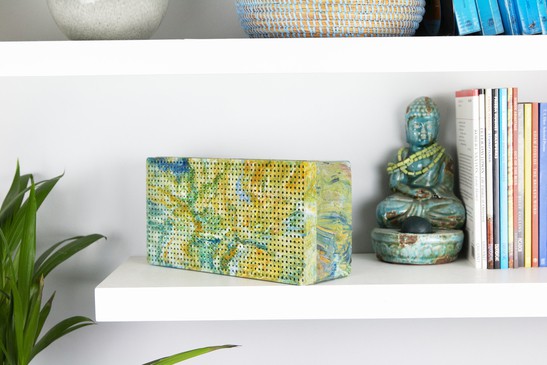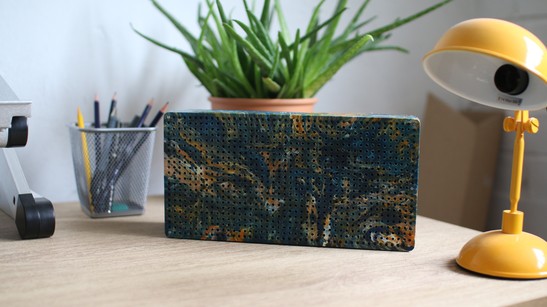
Currently seeking backing on Kickstarter, Gomi takes flexible plastic (LDPE) such as bubble wrap, plastic bags and pallet wrapping, then melts and compresses it to create a sturdy eco-friendly material. The speaker’s design is the work of Tom Meades, a recent grad from the University of Brighton. Alongside colleagues Pawan Saunya (Richmond Upon Thames College) and Rishi Gupta (Imperial Business School), Tom is hoping to crowdfund £45,000 over the next month to get Gomi up and running.
“We were inspired by the cradle-to-cradle design process, thinking about our products full-lifecycle right from the beginning of our design process,” said Gomi co-founder Tom.
“With our Bluetooth speakers, we want to intercept a waste stream that would otherwise be landfilled or incinerated. Flexible plastics/LDPE is widely regarded as non-recyclable by UK councils, and so we thought this would be the perfect material to harness and show that through innovative design this can be valuable, and does not have to end up as waste polluting our environment. Instead, we can craft this material into desirable objects.”
According to Gomi, the speaker is made from three modular marbled-plastic components using a combination of traditional craft techniques and digital fabrication. Each speaker incorporates the equivalent of 100 plastic bag worth of flexible plastics. The devices are hand-marbled, which means that every product has its own individual aesthetic. A video on the company’s Kickstarter page also claims that recycled denim is used for the sound insulation and that the speaker will be good for up to 18 hours of continuous listening.

“Our components are made from 100 per cent non-recyclable plastic,” Tom said. “We have worked with audio professionals and electronics engineers over the past twelve months to ensure the product is not only aesthetically desirable but also sounds great. We have also paired up with major food wholesalers in Sussex, who have vast amounts of this specific plastic waste. We are also accepting plastic waste from households, and local stores, which is where we can have an interesting mix of colours between the waste streams.
“We are currently looking at new ways we can increase our storage capacity, and scale-up our production process to intercept more waste, and we hope to use the Kickstarter funds to achieve this.”





Poll: Should the UK’s railways be renationalised?
I _do_ remember British Rail - and that it was <i>literally</i> a national joke https://youtu.be/zV2lmSDKvO8